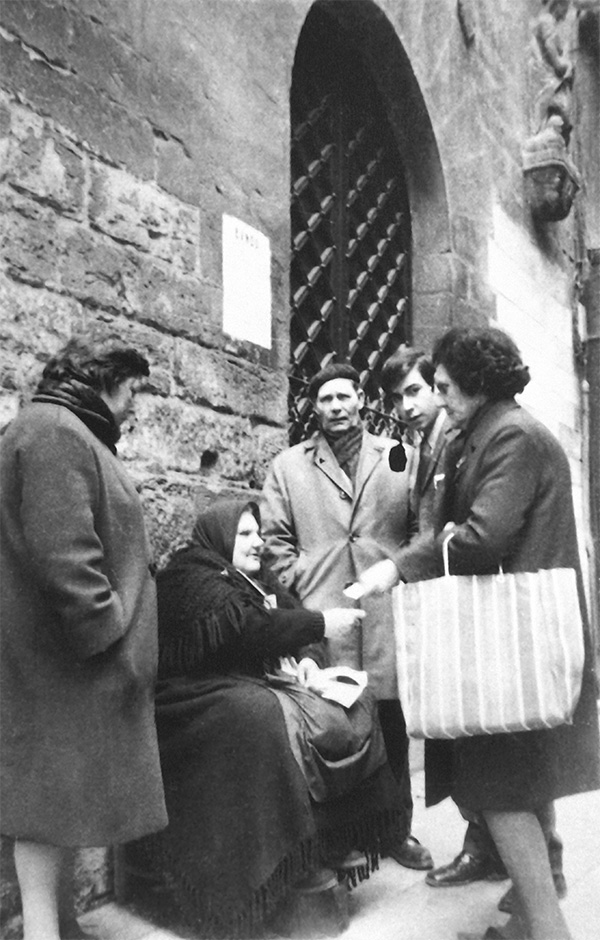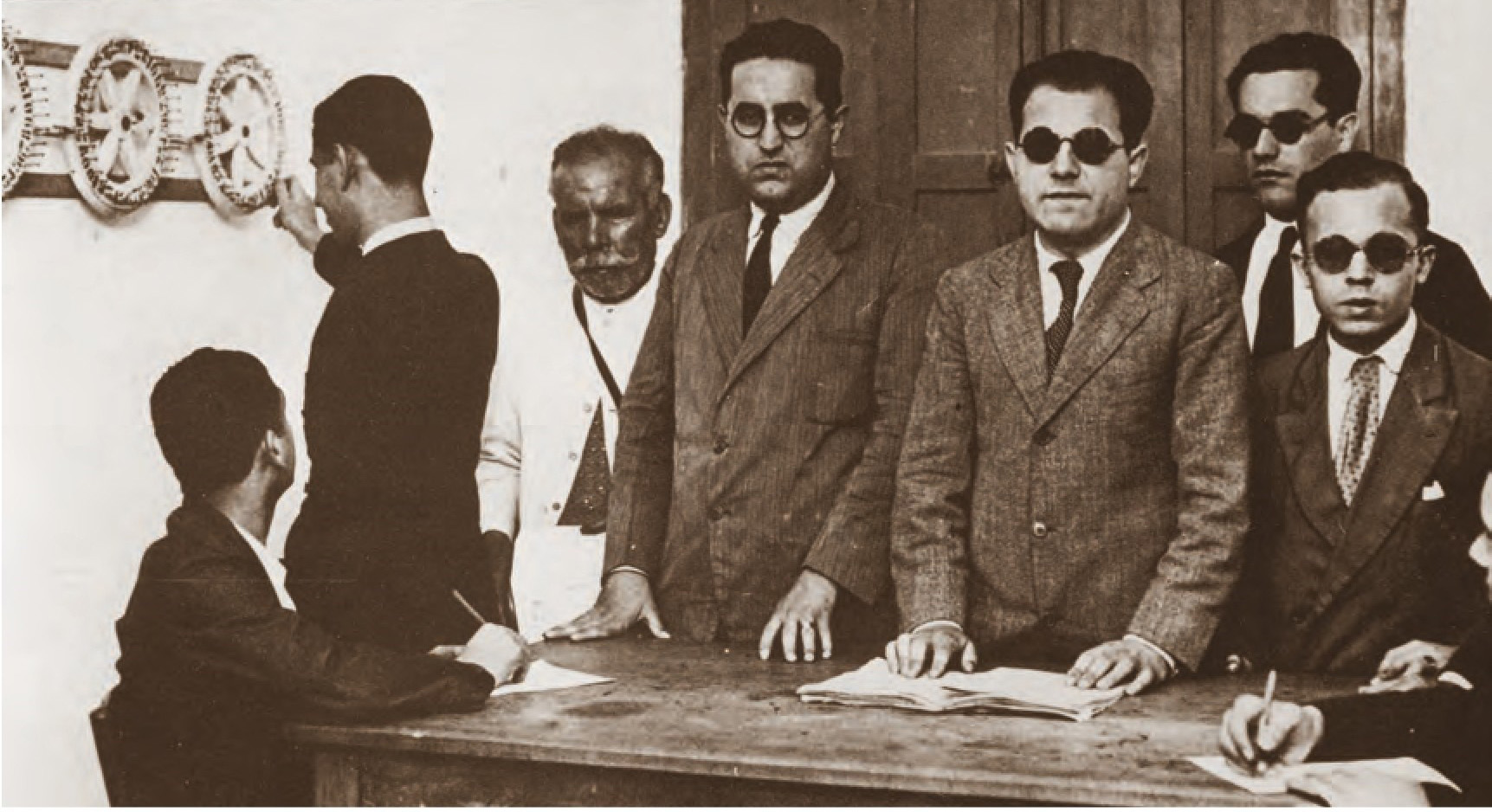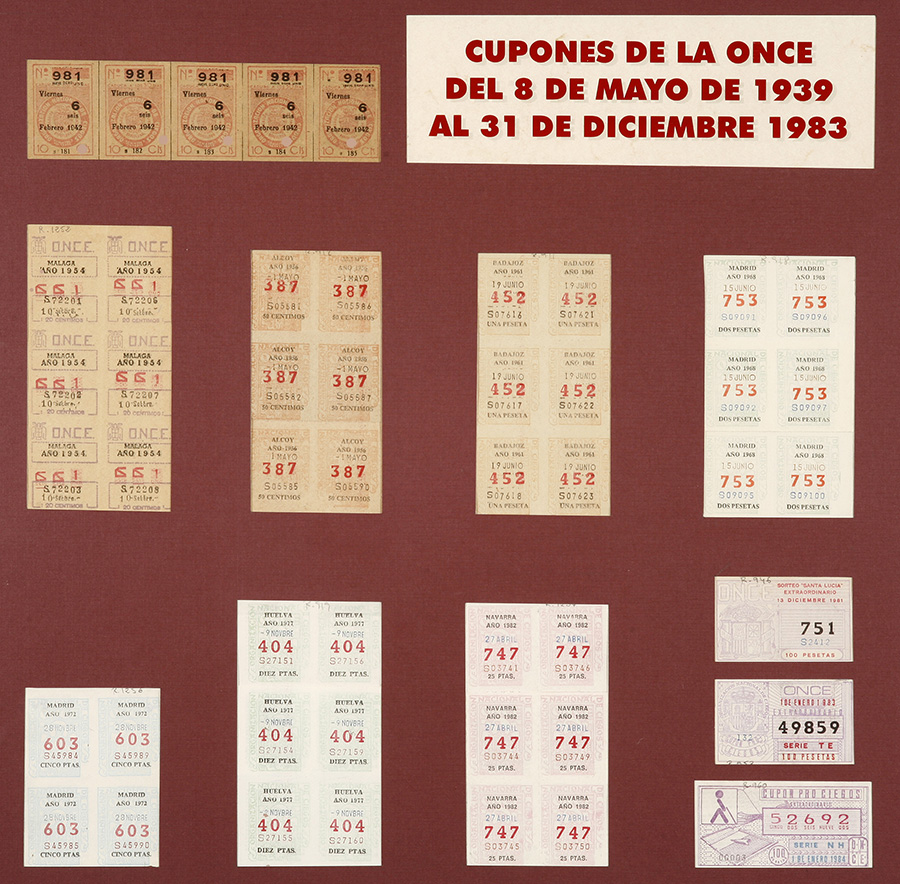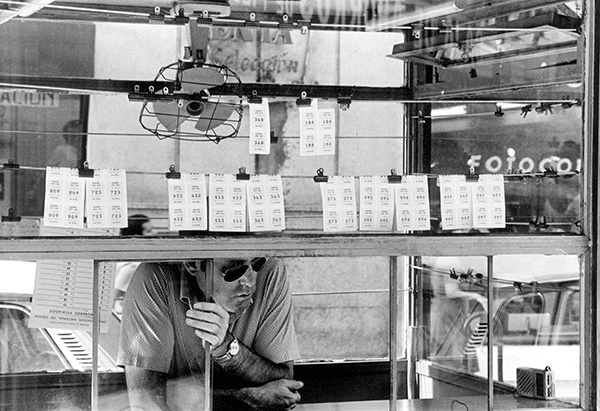History and origins
Take a walk through our origins with Oncelio
We have been working for more than eight decades to improve the lives of blind persons and persons with other disabilities
What is the ONCE Social Group?
To understand what the ONCE Social Group represents, we must go back to the beginning of the 20th century, years in which, having overcome the great Spanish crisis of the 19th century, all citizens aimed for a better quality of life.

In the early 20th century, some street raffles began to appear, sometimes conducted by blind persons who also wanted to earn a decent living. Particular attention should be drawn to the most popular raffles held in Spain's Levante area, where a group of blind persons created what would later become the "cupón prociegos".
In 1903, coinciding with the traditional raffle for the festivity of San Antón in the Alicante neighbourhood of the same name, Francisco Piuzano and Juan Quinto Serna, blind persons, saw this raffle as an opportunity to benefit those who, like them, were out of work, and decided to copy the model and hold this daily raffle, thus creating 'La Caridad' or 'rifa deis ceguet', the raffle of the blind persons of Alicante.
It sold one thousand cupón per day at the price of ten cents. The sellers undertook to sell one series with one hundred numbers and of the 10 cents per ticket, six were allocated to the prize, one to La Caridad and three to the seller.
In those years, sellers were usually accompanied by their guide, which is why the sale began to be popularly called 'la rifa de las parejas’ (the raffle of couples), and in areas such as Murcia and Almería, where this system was copied, it was called 'los iguales’ (the equals). This is the origin of a concept that has accompanied us to this day, one century later, and which has become a cry in the streets and squares of the whole country.
In the early 1930s, some Spanish blind persons began to consider the possibility of joining forces. In 1935, following a meeting between Alejandro Lerroux, then president of the government, and Javier Gutiérrez de Tovar, president of the Seville association of blind persons 'La Hispalense', the first steps were taken to legalise the sale of these lotteries.
At that time, the work conducted in Catalonia by the "Sindicat de Cecs", with the collaboration of the Commissariat for Social Assistance, was also noteworthy, and they introduced the first cupón prociegos in Catalonia.
In June 1935, an important milestone was reached when several associations of blind persons from Madrid, Andalusia, Levante and Catalonia came together to approach the government with the intention of obtaining provisional authorisation to sell, although the arrival of the war changed the plans.

On 25 August 1938, Gutiérrez de Tovar addressed the Congress of the Asociación Española para el Progreso de las Ciencias (Spanish Association for the Progress of Science) where he defended the need for Typhlology, as the sum of knowledge related to blind persons, to be considered one of the most important social sciences as a form of social integration for blind persons.
This meeting, with a distinctly social focus, promoted the creation of the National Organisation of the Blind, ONC, the term "Spanish" was incorporated into the name in April 1952, becoming the ONCE, and the sale of the cupón was defended as an economic way to guarantee the Organisation's social improvement, autonomy and self-sufficiency.
Meanwhile, the government of the time did not look favourably on this reality emerging from the associations and had prepared a project for a Board of Patrons of Blind Persons, endowed with municipal, provincial and state subsidies, and a pension for each blind person in need.
In the aftermath of the Civil War, a common project prevailed: to create a national organisation of the blind which, although managed by blind persons themselves, would be supported by the State, in order to ensure compulsory membership for all persons who are blind or with severe visual impairment. The source of resources and employment would be, exclusively, the cupón (lottery ticket).
On 13 December 1938, the festivity of Saint Lucia, patron saint of blind persons, decree 22.893 was signed, the text being included in the Official State Gazette of 16 December 1938, from which the ONC-Organización Nacional de Ciegos (National Organization of the Blind), officially began its journey.
The first cupón of the National Organization of the Blind was drawn on 8 May 1939. It was held in Madrid and the prize was awarded to number 922.
These were exceedingly difficult years in which blind persons struggled to survive in a country that was just emerging from the Civil War and had hard years ahead. The cupón lottery was already well established in Spanish society despite the difficulties it faced.

Based on its format, the formulas used to sell the cupón changed over the years. The activity had been strengthened and the ONCE 's income statement reflected this success, linked to the first social awakening in Spain, in a period of developmentalism.
The Organisation promoted the creation of first job initiatives such as the brush and confectionery factories in Madrid. In other towns, such as Alicante, a workshop making baskets, brushes, espadrilles and string; in Zaragoza, a workshop making brooms and wicker articles; in Catalonia, a factory making cleaning articles or one of the most popular initiatives: the "Santa Lucía" sweets factory in Zaragoza, where many blind women worked.
In those and subsequent years, the aim was to develop a plan focused on training and creating employment centres as an alternative to selling the cupón.
In 1963, coinciding with its 25th anniversary, the ONCE focused its efforts on promoting free education for all members of the Organisation through a wide network of special centres for training and preparing quality employment of all its members, which led to creating new vocational training centres and occupational workshops.
Four outstanding projects were the Escuela de Telefonía (School of telephony), which began its activity in 1966; the Escuela Universitaria de Fisioterapia de la ONCE (School of Physiotherapy), which started in 1964 and has become today Physiotherapy; the Centre for Rehabilitation and Vocational and Industrial Training, in 1966, and the Social Rehabilitation Centre for Adult Blind persons, which started in 1973.
Training was also provided to visually impaired persons in rural areas through initiatives such as the Poultry Farm School. On the other hand, cultural initiatives such as specific libraries for blind persons, Braille printing presses and the "Libro Hablado" service, access to education and culture and initiatives linked to training centres were given a major boost.

The 1970s, brought great political changes in the country. These were years of crisis and the integration of persons with disabilities into the labour market slowed down. But the seed was sown and blind persons who were members of the ONCE, especially young persons trained in schools and some from university and trade union movements, raised their voice to the rhythm of Spanish society.
Democracy forced its way into Spain, but it took a little longer at the ONCE. In 1981 a Royal Decree was passed which established the democratic bases and opened the way for the first ONCE elections, which took place in January 1982 and in which Antonio Vicente Mosquete was elected Chairman. A General Council elected by its members steered the Organisation towards economic recovery, succeeded in generating wealth and translated it into welfare for members, with significant improvements in the quality of life of blind persons in Spain.
The liberalisation of gambling (1977) and the subsequent decriminalisation (1983) forced the ONCE to update its cupón to make it more attractive and stop losses in the market. Thus, on 13 December 1981, the first extraordinary lottery draw was held.
On 2 January 1984, a major reform of the cupón was conducted, changing the lottery draw to a national one and substantially increasing the prizes. The first major advertising campaign was launched with the slogan 'La ilusión de todos los días' (every day’s hope) and was so successful that all expectations were exceeded. On 4 October 1985, a second product was created, the Super Sorteo Fin de Semana (Weekend Superdraw ) with five digits for the cupón, which allowed the sellers to have a working week from Monday to Friday.
The ONCE had embarked on a path into the future, supported by the large commercial offering. On 1 October 1987, the Friday "Cuponazo" was launched. The Cuponazo, which offered 100 million pesetas for the price of 100 pesetas, was a complete success on the street. All this success led the Organisation to a good economic position that allowed it to make business investments and to set up a small group of companies (Fundosa and later Ceosa) with which it tried to prove that it was possible to include persons with disabilities into the labour market, and moreover, that it was profitable. These were the first business steps, which would adapt to the realities of the country and which would conclude in 2014 with the creation of Ilunion.
The good financial results made it possible to extend solidarity to other collectives and the ONCE created the Fundación ONCE for the cooperation and social integration of persons with disabilities, which was financed with 3 percent of the gross income from the sale of the cupón.
But this did not stop there. In 1990, social services for blind persons continued to be a priority and as a result, the ONCE Guide Dog Foundation was set up, its purpose being to breed and train guide dogs for blind persons or severely visually impaired persons, and thus contributing to improving their autonomy and the safety of their movements.
The last decade of the century marked a qualitative change in training and employing blind persons and persons with other disabilities, along with a good economic reality that boosted education and training processes and initiatives for persons with disabilities in Spain and abroad.
In fact, the Organisation, which was already participating in international forums, launched its model outside Spain and created in 1988 the Fundación ONCE para América Latina (FOAL) (ONCE Foundation for Latin America) which focuses its activity on implementing education, training and rehabilitation projects in this region of the planet, and in other depressed areas. It is currently active in 19 countries.
Other international forums such as the World Blind Union (WBU), the European Blind Union (EBU) or the International Council for Education of People with Visual Impairment (ICEVI) were gradually being established.
The new information technologies are key players in the 21st century and the ONCE is making every effort to renew itself and make accessibility an essential interval: adapted mobile telephony, talking devices incorporated from production, Apps with infinitely many utilities, etc.
For persons with disabilities, technology opens up new ways of communication and, in the case of deafblind persons, it even connects them to the world. Since 2007, this group of persons with very specific needs has had a new foundation to help them in their day-to-day lives: the Fundación ONCE para la Atención a las Personas con Sordoceguera (FOAPS) (ONCE Foundation for the Care of Persons with Deafblindness).
The ONCE continues to promote its social aspect - supported by responsible, safe and social lotteries - and participating in open debates on social economy. The Social Economy and Gambling laws were then passed, which led to reforming the Royal Decree regulating the ONCE, giving us the possibility for the first time of establishing agreements with European gambling operators (the seed for the launch of the Eurojackpot in 2012) and opening up new channels and modalities such as instant lotteries, always under the strict principles of Responsible Gambling, endorsed and certified by the most demanding evaluation and monitoring systems defined by the Asociación Mundial de Loterías y la Asociación Europea de Loterías y Totos del Estado (World Lotteries Association and the European Lotteries and State Lotteries Association).
A major milestone was the celebration of the 11/11/11 draw with a large institutional event attended by the then Princess Letizia and a televised gala that included the draw of the cupón, which was a leader in terms of audience figures.
In 2014, all the companies under the ONCE and ONCE Foundation merged into a single initiative that took on a very representative name: the sum of ilusión and unión (hope and union) gave rise to the creation of Ilunion, the new brand that represents this group of companies and combines the experience accumulated by the first two areas: social and foundational for more than three decades. Ilunion is proof that a social economy is possible, a business and social model made up of persons, a high percentage of whom are disabled, working for persons.
Ilunion results from the binomial ilusión and unión, two of the keys to the history of the ONCE and its Foundation, and it was created to prove that it is a group of work centres and companies with great experience and significant economic and social results.

This was followed by a debate on a name that would be capable of defining the spirit of the three areas in which the organisation operates under a common denominator. There is no doubt: the ONCE Social Group concept was born, a brand that is more than the sum of the ONCE, the ONCE Foundation and Ilunion, it is an ongoing commitment to citizenship from the joint development, to try to promote fairer and more inclusive societies: ONCE as a service provider for blind persons supported by its work as an operator of a responsible, safe and social lottery; the Fundación ONCE as a lever for employment, training and accessibility; and the Ilunion social companies, which provide many blind persons, persons with disabilities, persons without disabilities and others at risk of exclusion the opportunity for training and decent work.






